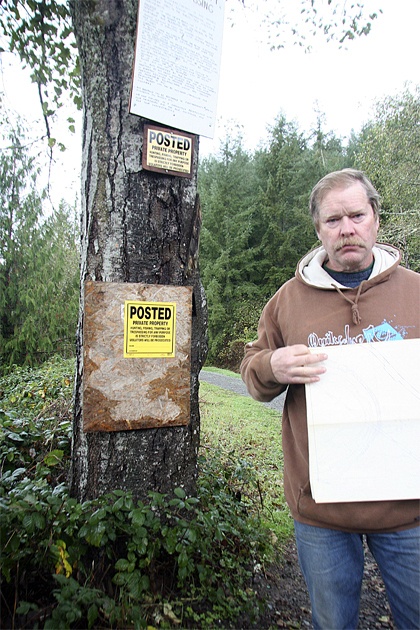Trail enthusiasts in Fall City are concerned that a recent property sale by Weyerhaeuser timber company has shut down an important access point to the Snoqualmie Valley Trail.
The sale of 65 acres on the Rutherford Slough, which includes gated access linking the regional trail system with Fall City Community Park, closed last week. A private owner bought the property for $299,000 — $5,000 more than the asking price.
Since the sale, trail users have noticed ‘No Trespassing’ signs at the gate.
“What this is about is equal access,” said Leslie Kellogg, a Fall City resident and member of Raging River Riders, Cascade Land Conservancy and the Washington Trails Association.
Fall City Park’s large parking lot allows a variety of people, with different income levels and interests, to access the trail at the same time, Kellogg said.
Other local access points exist, but few can take more than a few vehicles at a time, Kellogg said. The Rutherford Slough gate “is probably the biggest area of public access” in Fall City, Kellogg said.
“Future access is up to the new owner,” said Anthony Chavez, Public Affairs Manager for Weyerhaeuser.
Chavez said Weyerhaueser realized early on that there were issues of access on the property, and gave the county plenty of notice that the property was for sale.
“We reached out to the local community and government agency,” Chavez said. Cascade Land Conservancy and the Mountains to Sound Greenway Trust were also notified.
“We did make a concerted effort to give them first crack at it,” Chavez said. “At the end of the day, it does go through a competitive bid process.”
King County’s Parks Division worked with the Cascade Land Conservancy to make a bid for the parcel. The county offered the asking price.
Parks Division Director Kevin Brown said the county is now involved in talks to maintain public access via 39th Place.
“We do have a high level of interest,” Brown said. “We’re hoping to have conversations with the buyer” on continued access.
“It is a very, very important connection for us and has been a primary access point for the community and the region to the Snoqualmie Valley Trail,” Brown added.
If those talks fall through, the county is eyeing other, alternative access points for the trail — described by Brown as “plan B.” None of those have the access capabilities of 39th Place, however.
“We’re challenged by their location,” Brown said. “We’re challenged by the size of the parking lots there.”
New sign
A week ago, a new sign was posted at the path’s entrance.
“This gate/access/property is now privately owned… and is no longer open to the public, per insurance requirements,” the hand-made sign stated. “However, it has never been, nor is it now, the intent of the owners to deny access to courteous or respectful users.”
“Anyone claiming to know the owner’s intent previous to this notice is spouting pure wind,” the sign states.
The sign goes on to state that legal and liability issues are being discussed to allow public access. While these issues are being discussed, access is not allowed. The owners will eventually announce a meeting, inviting interested parties to discus progress and rules of use.
Meanwhile, trespassers will be arrested, prosecuted and permanently denied access. Also, trail users who confront the new owner will also be denied access.
The sign also requests that groups who call a meeting to discuss the property invite the owner, “rather than have meetings designed to promote… inflammatory or adversarial relationships counterproductive to all.”
“We look forward to a harmonious relationship with our neighbors and ask for your assistance and your understanding,” the sign writer concludes.
The new owner could not be reached by press time. King County parcel data had not been updated, and showed Weyerhaeuser as the owner of record.
Kellogg said there is still some resentment in the Lower Valley to past Weyerhaueser developments such as Snoqualmie Ridge. Preserving trail access in Fall City, she said, would have been an easy and inexpensive way to preserve Lower Valley trust.



